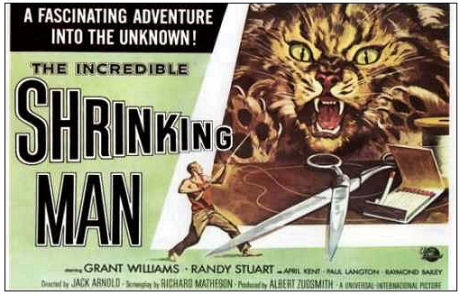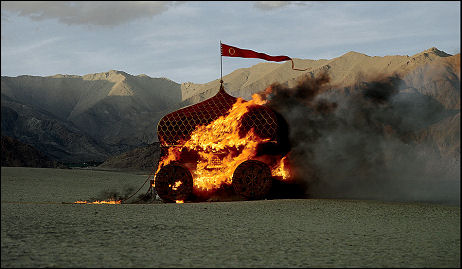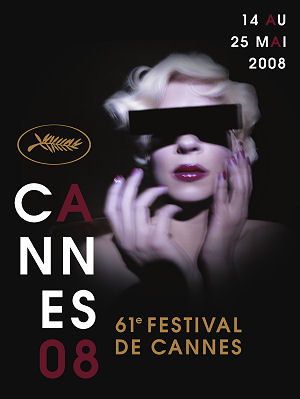“Over on my Hebrew blog I often bitch about how long it sometimes takes for a high-profile American movie to cross the Atlantic and reach screens [in Israel]. Sometimes it takes an eternity, and some films wind up not even playing theatres. Into the Wild and The Assassination of Jesse James were straight-to-DVD releases over here. But with 88 Minutes roles are reversed: this one was released theatrically about a year ago, and is now already available on DVD. Only now it reaches American screens. Too bad for you guys.
“Remember that Avi Lerner and Danny Dimbort, the film√ɬ¢√¢‚Äö¬¨√¢‚Äû¬¢s producers, are Israeli ex-pats, and that Samuel Hadida, the film√ɬ¢√¢‚Äö¬¨√¢‚Äû¬¢s French co-financier, has a ownership stake at the megaplex owned by the film√ɬ¢√¢‚Äö¬¨√¢‚Äû¬¢s Israeli distributors.” — from a 4.19 review on Israeli blogger Yair Raveh‘s column (otherwise known as Cinemascope),which appears in both Hebrew and English.
Can’t Catch a Break
Roger Ebert‘s attendance at Ebertfest (4.23 to 4.27) is uncertain due to having suffered a recent hip injury after falling during a visit to the Pritikin Center in Florida. He’s now recovering at Northwestern Memorial Hospital in Chicago. “The show must go on!” Ebert has stated in a press release. “I am doing fine and if the doctors clear me, I will be there to welcome our guests, including Ang Lee, Paul Schrader, Richard Roeper, Richard Corliss, Sally Potter, Christine Lahti, Rufus Sewell, Timothy Spall, Michael Barker and many others. But whether or not I am there, the audience will see some amazing films.”
Galumph Performs Decently
I’m in San Francisco, my box-office guy hasn’t called, my iPhone is hiding out in the car so I’m going with Steve Mason‘s Fantasy Mogul weekend estimates. I don’t know anyone who gives two shits about The Forbidden Kingdom, but the martial arts pic that costars (as opposed to toplines) Jackie Chan and Jet Li has elbowed Forgetting Sarah Marshall aside and taken the weekend’s first-place trophy. The chopsocky will take in an estimated $19 million vs. $18 million for Judd Apatow‘s emotionally naked galumph relationship comedy that whatsisname…you know, uhm, Nicholas Stoller directed.
Box-Office Mojo reports that The Forbidden Kingdom is playing at 3,151 locations, Forgetting Sarah Marshall is on approximately 3,400 screens at 2,798 theaters, the Al Pacino turkey 88 Minutes is playing on 2,400 screens at 2,168 sites, and Expelled: No Intelligence Allowed enters 1,052 venues.
Mason is reporting a mild case of Apatow fatigue and an “Apa-thetic” audience response to Forgetting Sarah Marshall in view of its $18 million earnings being the eighth-best Apatow opening tally (the first seven being Talladega Nights, Superbad, Knocked Up, Anchorman, The 40-Year-Old Virgin, Kicking and Screaming and The Cable Guy). Mason is being too rough on the guy. I predicted a few weeks ago that Marshall would be a good enough-er and a maintainer of the brand, and it seems to be doing that.
Okay, Okay….
Despite Indiana Jones and the Kingdom of the Crystal Skull composer John Williams having said in that recent You Tube video clip that the film is “seven reels long [with] each reel being 20 minutes,” and therefore 140 minutes give or take…it’s not. Producer Frank Marshall called Paramount publicity today to inform that the film is maybe a tad over two hours including credits. So Williams was blah-blahing…whatever.
Spill It
Director Vadim Perelman “wants everyone to know the ending of his film The Life Before Her Eyes before they see it,” writes Arizona Star critic Phil Villarreal. “He says you’ll understand and appreciate the movie better if you’re aware of the late-film twist.
“The story follows the plight of a woman in her 30s, played by Uma Thurman, [who’s been] traumatized by a high school shooting she survived. In the flashback scenes her character is played by Evan Rachel Wood, who, along with her friend, is confronted by the killer in the school bathroom.
“Perelman says most of the film takes place in the mind of the girl as she lies dying in the bathroom.” Yeah, but which girl? The friend or Wood’s character? Villarreal doesn’t make this clear (not in this excerpt, at least) and I’m not going to be the one to say.
“What√ɬ¢√¢‚Äö¬¨√¢‚Äû¬¢s strange about this film is unless they know the twist, I don√ɬ¢√¢‚Äö¬¨√¢‚Äû¬¢t think they enjoy the movie,” Perelman tells Villarreal.
“The reviews that are trickling in say the metaphors are too heavy-handed. But by the time you know what the twist is, you√ɬ¢√¢‚Äö¬¨√¢‚Äû¬¢re kind of past it. Every single one of the visual metaphors and echoes only exist to support the main concept that she imagines her future life in front of her eyes. I√ɬ¢√¢‚Äö¬¨√¢‚Äû¬¢ve come to the conclusion that it√ɬ¢√¢‚Äö¬¨√¢‚Äû¬¢s better to know and kind of follow along. I can√ɬ¢√¢‚Äö¬¨√¢‚Äû¬¢t expect people to see it twice.√ɬ¢√¢‚Äö¬¨√Ǭù
Road Rage
I’ll be driving up to San Francisco in an hour and arriving sometime around 6 or 7 pm. I’d love to be able to file from the road (I’m sure someday this’ll be a snap), but the vibration in even a brand-new Prius makes typing all but impossible.
Shrinking Murphy Man
Eddie Murphy starring in a comedic remake of Incredible Shrinking Man under director Brett Ratner and producer Brian Grazer? My feelings about Murphy aside, I would definitely pay to see this. It’s commercial. Think about it for ten seconds (Murphy vs. the big cat and big spider) and it almost makes itself in your head. The most recent draft of the screenplay is by Thomas Lennon and Robert Ben Garant. If anyone has a PDF version…

Golden Years

Snapped about halfway through last night’s Young @ Heart concert at the Wilshire theatre, which was beautifully performed in every way imaginable
Praising The Fall
It’s hard to feel interested about Tarsem Singh‘s The Fall given its long history of shooting going back to ’04 or thereabouts. I don’t trust films that take forever to be made, and it’s hard to be interested in a film that showed at Toronto almost two years ago and generated no buzz. Then again, it’s being “presented” by David Fincher and Spike Jonze so it obviously has some level of quality and integrity.

Roadside Entertainment is releasing The Fall on May 9th, and to support this a screening was held last night at the Armand Hammer museum. I was invited but decided to go to the Young @ Heart concert instead. An HE reader named Grant McFadden attended, and this is partly what he wrote this morning:
“I absolutely implore you to please, please see The Fall, as I truly believe you will agree that it is, without question, a landmark film of our time. It is phenomenal.
“Allow me to reiterate what I’m sure you already know. 24-plus countries. 2 years to make. 16 1/2 years of scouting. Fully financed by Tarsem himself. When cash got low, he purposefully would arrange for a commercial shoot in a particular part of the world to make the cash on the side…and then continue the shoot.
“The little girl’s performance is insanely brilliant. From the q & a, Tarsem revealed that she hadn’t acted before…and didn’t really understand what was going on until about a third of the way into the shoot. She was convinced that Lee wasn’t an actor and that he truly was a paraplegic. (This isn’t a spoiler) But when she did catch on to the whole acting thing….she thrived and nailed her scenes. Every time. This, according to Tarsem.
“The film is tragic, surreal, hilarious, epic. It captures his brilliant artistic production design while remaining true to the narrative that builds with empathy to the very end. It is Ford, Chaplin, Dali, Del Toro, Brooks, Tarkovsky….and so on. I have no faith in Roadside Attractions to market this film. They will step and then kill it.
“Please see this. It needs great word of mouth. Particularly yours. I have no connection to this film. I’m simply an earnest cinephile who wants to scream in angst when something this beautiful is put through the ringer. But there is no question….The Fall is one of the great films of our time.”
Hair Is Almost Everything
Bouncing off New York‘s 4.17 Vulture item about lowered expectations for the upcoming Tribeca Film Festival screenings of The Wackness (“Why Reviews for The Wackness Might Be Mad Wack, Yo”), here’s a re-post of my reaction to Jonathan Levine‘s film, which I tapped out at the end of Sundance ’08:

“I’m not saying that this well-made under-30 relationship film is dimissable, but it just doesn’t have that schwing. At best it’s an in-and-outer — mostly out. Set in ’94, The Wackness is an urban buddy saga (older therapist, teenaged pot dealer) with a funereal visual palette (i.e., covered in dark gray-green murk) and a vaguely off-putting, constantly medicating male lead (Josh Peck) with a haircut that I came to really and truly hate by the 30-minute mark.
I may as well as admit that I see Peck as another big galumph — a galumph with greasy black hair and an affected Dr. Dre speaking style, which is how a lot of hip urban kids who grew up in the ’90s tend to sound. I took an instant dislike to Peck during my endurance time with The Wackness last January. Street homie dawg…yo!
“The only unmitigated plus about this film is Ben Kingsley‘s nicely skewed performance as the pot-smoking therapist. But, as I wrote during Sundance, ‘when you add in Peck’s weirdnesses and all those cigarettes and doobies that everyone keeps sucking into their lungs and before you know it you’re thinking about hitting a health club just to flush the experience out of your system.'”
Blue and Low
Here’s the official 2008 Cannes Film Festival poster, but my interest levels have dropped considerably since the news about Steven Soderbergh‘s two Che Guevara films, The Argentine and Guerilla, most likely not being part of the festival lineup broke last night. I’d been nurturing the idea that the Soderbergh flicks would be the emotional centerpiece of the festival — hugely ambitious, political glamour factor, controversial, hot button, Oscar contender (certainly by way of Benicio del Toro‘s lead performance). Without them I feel truly bummed.

Yesterday afternoon the Cannes balloon was full and ascending. This morning it’s deflated and back on the ground with everyone standing around with their arms folded and saying to each other, “Hmmm….well, maybe.” Variety‘s Todd McCarthy has written (or implied) that there’s an outside chance that the Soderbergh twins might be slipped in at the last minute, but it’s one of those “don’t hold your breath” advisories. Now I’ve got this idea in my head, which I’m not married to and am willing to try and flush out, that Cannes ’08 is going to be somewhere between passable and a ho-hummer.
McCarthy has also reported that Woody Allen‘s Vicky Christina Barcelona won’t make it either — terrific — but the animated Kung Fu Panda (with Jack Black voicing the lead role) will. King Fu Panda?
Charlie Kaufman‘s Synecdoche, New York, in which Philip Seymour Hoffman plays a theater director, is a lock also.
And of course, there’s the 5.18 screening of Indiana Jones and the Kingdom of the Crystal Skull in a special noncompeting premiere slot. Four days before the opening…big deal. I’m half-convinced by New York “Vulture’s” mention of a “mounting pre-lash” against this film. That USA Today quote from George Lucas is the clincher: “When you do a movie like this, a sequel that’s very, very anticipated, people anticipate ultimately that it’s going to be the Second Coming…and it’s not. It’s just a movie. Just like the other movies.”
McCarthy also writes that the Dardenne brothers The Silence of Lorna will screen at Cannes. Ditto Wim Wenders‘ The Palermo Shooting and Fernando Meirelles‘ Blindness.
Broken
“It was long hoped that Cannes vet Steven Soderbergh‘s Che Guevara double bill, The Argentine and Guerrilla, would premiere on the Croisette, but it seems that the director, who has wanted either both or neither of the films to play the fest, won’t be able to finish the four-hour-plus opus by deadline. Evidently, Soderbergh has essentially finished the second film but, despite non-stop work in recent weeks, hasn’t quite gotten the first half of the Benicio Del Toro starrer where he wants it.” — from Todd McCarthy‘s Cannes 2008 report in Variety, posted at 8 pm this evening.

